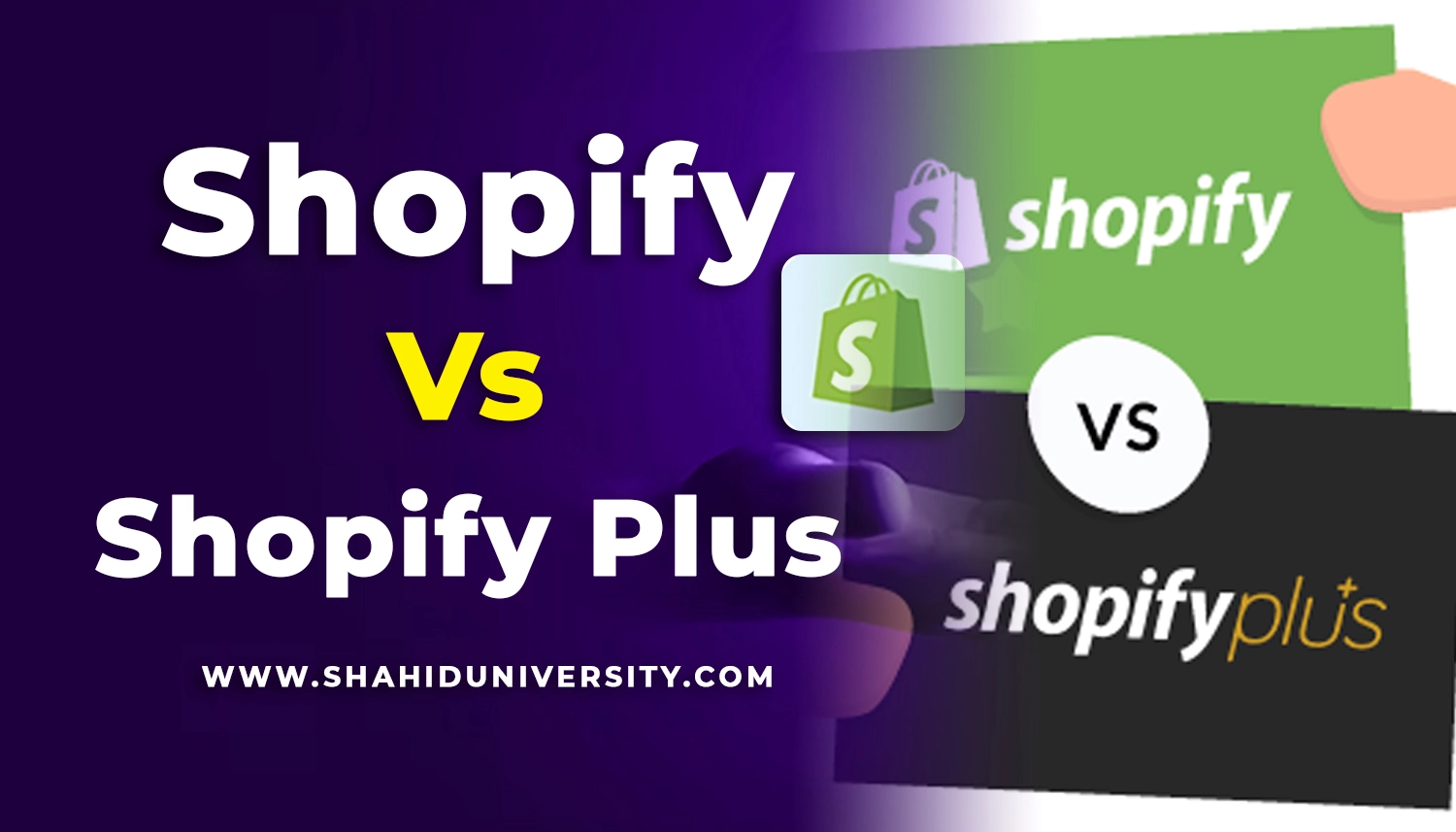In the constantly changing landscape of e-commerce, making the correct choice of an online store platform holds significant importance. Frequently, when discussing this topic, two names that frequently emerge are Shopify and Shopify Plus. Each platform boasts distinctive features and addresses varying business requirements. In this article, we will thoroughly explore the differences between them to assist you in determining which one aligns with your specific business needs.
Pricing and Affordability
When selecting an e-commerce platform, the key factors to consider are pricing and affordability. Shopify and Shopify Plus present distinct options in this regard. Shopify is well-known for its cost-effective pricing, making it an excellent choice for startups and small to medium-sized businesses. Its economical plans encompass a variety of features that address the diverse needs of online retailers.
Conversely, Shopify Plus, the premium version, is tailored for larger enterprises. While it provides a wide range of advanced features and capabilities, it does come with a higher price point. Nevertheless, for businesses with significant growth and scalability requirements, the additional investment can be justified. Ultimately, the decision between Shopify and Shopify Plus largely depends on your budget and the scale of your operation, ensuring that you obtain the best value for your investment.
Customization and Scalability
When selecting an e-commerce platform, it’s crucial to consider the importance of adaptability and the ability to expand. In the online business realm, there’s no one-size-fits-all solution.
Adaptability refers to the capacity to personalize your online store according to your unique brand and product offerings. Shopify provides a diverse range of themes and templates to create a visually appealing and brand-specific store. However, if your business requires intricate, tailor-made solutions, Shopify Plus takes customization to the next level. It empowers you to craft a completely tailored online presence that caters to the specific requirements of larger enterprises.
Conversely, scalability is the platform’s capability to grow in tandem with your business. Shopify Plus is built with larger businesses in mind, ensuring that your website can smoothly handle increased traffic, transactions, and data. It’s the combination of customization and scalability that sets Shopify and Shopify Plus apart in the e-commerce landscape, accommodating businesses of various sizes and aspirations.
E-commerce Features
E-commerce functionalities serve as the vital components for any online retail venture. They encompass a wide range of tools and capabilities intended to streamline the process of selling products or services on the internet. Essential e-commerce elements typically encompass product listings, shopping carts, secure payment processing, inventory control, and order fulfillment. These features not only make it easy for customers to explore and purchase items, but also empower businesses to efficiently oversee their online operations.
Furthermore, advanced e-commerce platforms often provide features such as customer reviews, personalized recommendations, and the ability to recover abandoned shopping carts, all aimed at improving the shopping experience and increasing sales. In the ever-changing world of e-commerce, having a robust set of e-commerce features is essential for businesses seeking success in the digital marketplace.
Security and Support
When choosing an e-commerce platform, it is crucial to emphasize security and assistance, and Shopify as well as Shopify Plus stand out in these areas. Both of these platforms place a strong emphasis on safeguarding your online store and customer information. They provide features like SSL certification, data encryption, and regular security updates to prevent potential threats.
Additionally, their customer support is comprehensive and readily available to help you with any issues or questions you may have. With a responsive support team, you can count on timely solutions to maintain the smooth operation of your e-commerce business.
In a world where concerns about online security breaches are prevalent, it is vital to select a platform that prioritizes and protects your data. Shopify and Shopify Plus offer peace of mind in this aspect, ensuring the safety of your business and customers.
Integration Capabilities
The ability to integrate with various third-party applications and services is a crucial feature of both Shopify and Shopify Plus. These platforms have gained recognition not only for their user-friendly interfaces but also for their capacity to seamlessly connect with a wide range of external tools and services. Whether it’s email marketing software, social media platforms, inventory management systems, or payment gateways, Shopify and Shopify Plus offer a diverse set of options to enhance the functionality of your online store.
This flexibility in integration empowers businesses to customize their e-commerce operations to suit their specific requirements, simplifying the management and optimization of their online presence. The capability to link with different tools and services streamlines the overall administration of your e-commerce business, making it a valuable asset for business owners and operators.
SEO and Marketing Tools
SEO and marketing tools serve as the foundation for the success of any thriving online enterprise. These crucial resources enable websites and e-commerce platforms to enhance their online presence, draw in visitors, and transform them into loyal customers. In the constantly competitive online landscape, SEO tools, which focus on Search Engine Optimization, are essential for fine-tuning content and ensuring it achieves higher rankings in search engine results. This, in turn, results in increased organic traffic and greater brand visibility.
On the other hand, marketing tools empower businesses to devise and implement effective marketing campaigns. Ranging from email marketing to managing social media, these tools are purpose-built to connect with audiences, cultivate relationships, and drive conversions. They offer valuable insights and data analytics, enabling businesses to refine their strategies for the best possible outcomes. The combination of SEO and marketing tools creates a powerful synergy, offering a pathway to success and sustained growth in the digital realm.
User-Friendly Interface
The standout feature of Shopify and Shopify Plus is their user-friendly interface, which makes these platforms accessible to entrepreneurs from diverse backgrounds. They offer an intuitive and visually pleasing dashboard that allows users to easily navigate settings, add products, handle inventory, and personalize their online stores. The drag-and-drop functionality simplifies website design, making it possible for anyone, even without web development expertise, to create a professional-looking e-commerce site.
This user-centered approach also extends to mobile responsiveness, ensuring a seamless shopping experience for customers on any device. With a well-organized backend, clear menus, and informative tooltips, managing your online business becomes effortless, allowing you to concentrate on the most important aspects: growing your brand and serving your customers.
Pros and Cons
Pros:
- User-Friendly Interface: Shopify and Shopify Plus are known for their intuitive and easy-to-use interfaces, making them accessible for users with varying levels of technical expertise.
- Customization: Shopify offers a wide range of themes and templates to customize your online store’s appearance. Shopify Plus, however, provides advanced customization options for larger businesses.
- Scalability: Shopify Plus is designed to grow with your business, ensuring that your online store can handle increased traffic and higher demands.
- E-commerce Features: Both platforms come equipped with essential e-commerce features such as product listings, secure payment processing, and inventory management.
- Security: Shopify and Shopify Plus prioritize security, offering robust measures like SSL certification, data encryption, and regular security updates to protect your online store and customer data.
- Support: Both platforms provide customer support and assistance to address any issues or queries you might have.
- Integration Capabilities: You can easily integrate third-party apps and services with Shopify and Shopify Plus, expanding the functionality of your store.
- SEO and Marketing Tools: These platforms offer built-in SEO and marketing tools to enhance your online visibility and attract potential customers.
Cons:
- Pricing: Shopify Plus comes with a higher price tag, making it less affordable for small and medium-sized businesses compared to the more budget-friendly Shopify.
- Complexity: While Shopify is user-friendly, Shopify Plus, with its advanced features, may require more technical expertise to fully leverage its capabilities.
- Overkill for Small Businesses: Shopify Plus might be overkill for small businesses with simple needs, as its advanced features and higher cost may not be necessary.
- Transaction Fees: Both platforms charge transaction fees for each sale, although the fees are lower for Shopify Plus. This is an added cost to consider.
- Learning Curve: Despite their user-friendly interfaces, there may still be a learning curve for users new to e-commerce or online store management.
- Third-Party App Costs: While integration is a pro, some third-party apps and services may come with additional costs, potentially increasing your expenses.
- Limited Control Over Hosting: Both platforms host your website, which means you have limited control over the hosting environment, unlike self-hosted solutions.
Which One is Right for You?
The decision between Shopify and Shopify Plus depends on your business’s specific needs, budget, and long-term goals. Consider all the factors we’ve discussed to determine which platform aligns best with your e-commerce aspirations.
Future of E-commerce with Shopify
The potential for e-commerce in the Shopify platform is quite promising. As technology advances, Shopify is expected to develop alongside it, providing fresh and creative solutions for online businesses. Some notable trends include incorporating artificial intelligence for personalized shopping experiences, using augmented reality for virtual product trials, and embracing voice commerce for effortless voice-activated purchases.
Furthermore, the importance of sustainability is on the rise, and Shopify is likely to contribute to eco-friendly practices, such as offering carbon offset options and sustainable packaging solutions. Additionally, as mobile shopping continues to grow, Shopify will likely prioritize optimizing its mobile experience and designing with a mobile-first approach to cater to the increasing demand for on-the-go shopping.
Looking ahead, we can anticipate enhanced data analytics and machine learning to further enhance customer insights and marketing strategies, ultimately resulting in more effective and efficient e-commerce businesses. Shopify’s adaptability and dedication to innovation position it well for the ever-changing landscape of e-commerce in the years to come.
Conclusion
In conclusion, the choice between Shopify and Shopify Plus boils down to your specific business requirements and goals. Both platforms offer a wealth of e-commerce solutions, but the decision should align with your budget, scalability needs, and the complexity of your enterprise.
Shopify, with its user-friendly interface and affordable pricing, is an excellent choice for small and medium-sized businesses. It provides essential e-commerce features and a variety of customization options to get you started quickly.
On the other hand, Shopify Plus is tailored for larger enterprises seeking advanced customization, enhanced scalability, and top-notch security. While it comes with a higher price tag, it can be a worthwhile investment for businesses with complex needs.
Ultimately, the key to success lies in a thorough evaluation of your business model, budget, and long-term aspirations. By carefully considering the pros and cons, you can make an informed decision and leverage either Shopify or Shopify Plus to unlock the full potential of your online store.
FAQs
-
Is Shopify Plus worth the higher cost for larger businesses?
The value of Shopify Plus depends on the scale and requirements of your business. It may be a worthwhile investment for larger enterprises with complex needs.
-
What are the key security features of Shopify and Shopify Plus?
Both platforms offer robust security measures, including SSL certification, data encryption, and regular security updates.
-
Can I switch from Shopify to Shopify Plus if my business grows?
Yes, it is possible to migrate from Shopify to Shopify Plus to accommodate the growth of your business.
-
Do I need technical expertise to use Shopify or Shopify Plus?
No, both platforms are designed to be user-friendly and do not require extensive technical knowledge to manage.
-
What are the marketing tools available on Shopify and Shopify Plus?
Both platforms provide a range of marketing tools, including email marketing, SEO optimization, and social media integration to help you grow your online presence.








